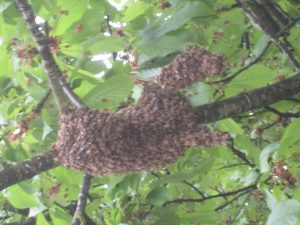This month sees the start of foraging in earnest and also the start of swarming.
Although the oil seed rape was only just down the road the bees only worked it for pollen. The bees foraging for nectar went in the opposite direction. I am now beginning to wonder if modern varieties of rape have significantly reduced amounts of nectar.
Whatever it was they preferred, half the hives worked it vigorously. One hive got up to four supers and the others to two or three.
The colonies which only just made it through the winter have struggled to reach supering size but as two of these have 2016 queens and will be requeened this season.
The first swarm I was called to remove was a poor little bedraggled specimen hanging from a tree near Thaxted Fire Station. It had been there several days and was trying to set up home out in the open.

It was nearly dark when I arrived so it had to wait until the next morning; a night of torrential rain and it was still raining next day. Half of them had been washed down in the night and were comatose mixed in with the recent lawn mowings. It was a ladder job to reach the little swarm and I then swept up as many as I could from the ground hoping that once they were returned to the bosom of their family they would become resuscitated. This did in fact work and most of them recovered. They were a pathetic little bunch when they were eventually hived; just over one frame of 14 x12 in a nucleus hive.
The rape finished flowering two weeks ago and any resulting honey would normally have started crystallizing by now. It’s all still clear which again leads me to conclude that the nectar came from elsewhere. The eventual analysis will be interesting.
I’ve had to perform three Pagden artificial swarms so far with another one to do this week. At the same time as creating the artificial swarm I also take a two-frame nucleus with a queen cell so I have a second string to my bow in the event of a loss on mating flight. The apiary is getting rather crowded now with sixteen hives.
